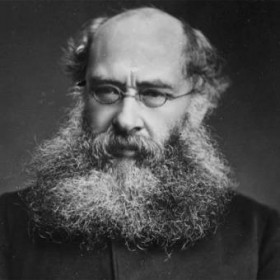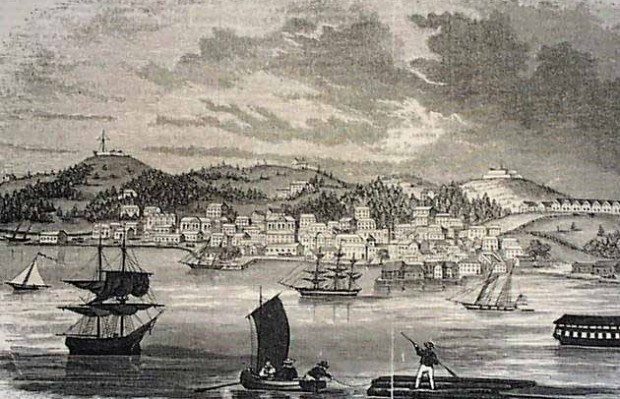Anthony Trollope’s Bermuda Chronicles
 One of the most popular and prolific writers of the Victorian era was a singularly reluctant visitor to Bermuda and found few good things to say about the island or its people in his letters or autobiographical writings. But he later used his time here as the point of departure for “Aaron Trow”, one of his most enduring short stories.
One of the most popular and prolific writers of the Victorian era was a singularly reluctant visitor to Bermuda and found few good things to say about the island or its people in his letters or autobiographical writings. But he later used his time here as the point of departure for “Aaron Trow”, one of his most enduring short stories.
Then working for the British postal service as an inspector and publishing fiction as a sideline, Anthony Trollope [1815-1882] related in his autobiography how he was sent to the West Indies in 1858 to ” cleanse the Augean stables of our post office system there.”
He ended his tour of duty with a brief visit to Bermuda, an unhappy stay he described in another memoir entitled “The West Indies and the Spanish Main.”
“Looking back at my fortnight’s sojourn there,” he wrote, “it seems to me that there can be no place in the world as to which there can be less to be said than there is about this island — sayings at least of the sort in which it is my nature to express itself.”
Trollope disliked the food and climate; he complained about the backwardness of local agriculture despite the opportunities afforded planters, the islands having “many gifts of nature to recommend them.”
Overall he found Bermuda mired in poverty.
“Perhaps, I should add,” he remarked, ” that on the whole she is contented with her poverty. And if so, why disturb such contentment? … The sleepiness of the people appeared to me the most prevailing characteristic of the place … To say that they live for eating and drinking would be to wrong them. They want the energy for the gratification of such vicious tastes.
“To live and die would seem to be enough for them. To live and die as their fathers and mothers did before them, in the same houses, using the same furniture, nurtured on the same food, and enjoying the same immunity from the dangers of excitement,”
Historian Walter Brownell Hayward said the Bermudians, for their part, regarded Trollope “as an erratic individual who was more fond of sea-baths than hard work …”
However, he could not escape certain of Bermuda’s charms. He liked the sea and the “singular way in which the land is broken up into narrow necks, islands, and promontories, running here and there in a capricious, half-mysterious manner…”
In the Bermuda chapter of ”The West Indies and the Spanish Main”, Trollope wrote: “But it is mostly the beauty of the sea and not of the land. The islands are flat, or at any rate there is no considerable elevation in there. They are covered through-out with those scrubby little trees [cedars] and although the trees are green and, therefore, when seen from the sea, give a freshness to the landscape, they are uninteresting and monotonous shore.
Contemporary engraving of St. George’s in the 1850s when Anthony Trollope visited Bermuda
“I must not forget the oleanders … The Bermudas might almost be called The Oleander Island.”
Trollope never did not forget the oleanders. Or Bermuda, either.
Two years after he visited. the island served as the setting for his short story “Aaron Trow.”
Its plot was inspired by the 1,500 English, Scottish and Irish prisoners Trollope had observed at Dockyard who had been transported to Bermuda “to divest these rogues of their roguery” by putting them to work on the naval base’s fortifications and other public works projects.
An English convict, Aaron Trow, was sent to the penal colony at Bermuda under a life sentence for murder. He escapes from prison and hides in a remote cave until search for him is abandoned.
Driven by hunger, and fearing detection until he could find means to leave the island, he broke into the isolated cottage of Anastasia Bergen, demanding food and money.
Excerpt from “Aaron Trow” [1860]
The vexed Bermoothes is a good name for them. There is no getting in or out of them without the greatest difficulty, and a patient, slow navigation, which is very heart-rending.
That Caliban should have lived here I can imagine; that Ariel would have been sick of the place is certain; and that Governor Prospero should have been willing to abandon his governorship, I conceive to have been only natural. When one regards the present state of the place, one is tempted to doubt whether any of the governors have been conjurors since his days.
Bermuda, as all the world knows, is a British colony at which we maintain a convict establishment. Most of our outlying convict establishments have been sent back upon our hands from our colonies, but here one is still maintained.
There is also in the islands a strong military fortress, though not a fortress looking magnificent to the eyes of civilians as do Malta and Gibraltar. There are also here some six thousand white people and some six thousand black people, eating, drinking, sleeping, and dying.
1848 wood cut of Bermuda convict hulks moored off the Royal Naval Dockyard
The convict establishment is the most notable feature of Bermuda to a stranger, but it does not seem to attract much attention from the regular inhabitants of the place.
There is no intercourse between the prisoners and the Bermudians. The convicts are rarely visited. As to the prisoners themselves, of course it is not open to them – or should not be open to them – to have intercourse with any but the prison authorities.
There have, however, been instances in which convicts have escaped from their confinement, and made their way out among the islands. Poor wretches! As a rule, there is but little chance for any that can so escape.
The whole length of the cluster is but twenty miles, and the breadth is under four. The prisoners are, of course, white men, and the lower orders of Bermuda, among whom alone could a runaway have any chance of hiding himself, are all negroes; so that such a one would be known at once. Their clothes are all marked.
Their only chance of a permanent escape would be in the hold of an American ship; but what captain of an American or other ship would willingly encumber himself with an escaped convict? But, nevertheless, men have escaped; and in one instance, I believe, a convict got away, so that of him no further tidings were ever heard.
Terrified by his uncouth appearance and menacing manner, she prepared food for him, but when she failed to provide money he attacks and nearly murders her before help arrives. Caleb Morton, Anastasia’s fiance at the risk of his life, corners Trow in his cave and in a dramatic battle on the rocks and in the sea killsd him.
“There is a sort of prettiness about these islands which, though it never rises to the loveliness of romantic scenery, is nevertheless attractive in its way,” the author wrote of Bermuda in the story. “The land breaks itself into little knolls, and the sea runs up, hither and thither, in a thousand creeks and inlets; and then, too, when the oleanders are in bloom, they give a wonderfully bright colour to the landscape.
“Oleanders seem to be the roses of Bermuda, and are cultivated round all the villages of the better class through the islands. There are two towns, St. George and Hamilton, and one main high-road, which connects them; but even this high-road is broken by a ferry, over which every vehicle going from St. George to Hamilton must be conveyed.
“Most of the locomotion in these parts is done by boats, and the residents look to the sea, with its narrow creeks, as their best highway from their farms to their best market. In those days — and those days were not very long since — the building of small ships was their chief trade, and they valued their land mostly for the small scrubby cedar-trees with which this trade was carried on.”
Trollope’s first major literary success had come with “The Warden” [1855] — the first of six novels set in the fictional English county of “Barsetshire” [the books are collectively referred to as the "Chronicles of Barsetshire"], usually dealing with the clergy. “Barchester Towers” [1857] has probably become the best-known of these.
A pioneer of multi-volume family sagas, Trollope’s other major series, the Palliser novels, concerned itself with politics, with the wealthy, industrious Plantagenet Palliser and his delightfully spontaneous, even richer wife Lady Glencora usually featuring prominently.
Read More About
Category: All, Entertainment, History



